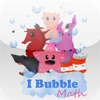My presentation about „iPad Human Interface Guidelines“ for today’s workshop:
[iPad App] Flipboard
Eine unglaubliche gute App ist ab sofort für den iPad verfügbar: Flipboard, das erste Newsmagazin welches auf meinen Sozialen Netzen beruht, d.h. dass Links die getwittert werden oder auf Facebook auftreten, auf meinem iPad direkt anschaubar sind.
Hier der Film dazu:
[tool] Memonic
Nun die Idee ist zwar nicht neu, aber nach wie vor erscheint sie mir interessant: Memonic erlaubt die Inhalt von Webseiten und ähnliches einfach zu speichern und so über gefundenes Übersicht zu wahren. Vielleicht schafft ich es ja diesesmal es regelmäßig zu verwenden:
[iPhone App] KiddyPaint
 Im Rahmen der Lehrveranstaltung „AK Medientechnologien“ ist die App KiddyPaint entwickelt worden:
Im Rahmen der Lehrveranstaltung „AK Medientechnologien“ ist die App KiddyPaint entwickelt worden:
Spiel – Spaß – Spannung
- kindgerechte spannende Motive
- lustige Aninmationen
- einfachste Bedienung
- selbstsprechende Symbole
- extra entwickelt für die Kleinsten
Hier kann die App downgeloadet werden [Link] und alle weiteren verfügbaren Apps der TU Graz findet man hier [iTunes Link].
[iPhone app] iBubbleMath
 Im Rahmen der Lehrveranstaltung „AK Medientechnologien“ ist die App iBubbleMath entwickelt worden:
Im Rahmen der Lehrveranstaltung „AK Medientechnologien“ ist die App iBubbleMath entwickelt worden:
iBubbles is a Math-Trainer especially developed and designed for kids from about 6 to 10. Simple multiplication (all tables up to ten) can be exercised in a playful way. Kids can choose between a trainingsmode and a quizmode. During the training there is no time pressure. To enhance the learning effect the player can guess several times until the right answer was chosen. In the quizmode the tasks should be solved as fast as possible to gain maximal points and to show up in the highscore. iBubbles is suitable for beginners as well as for advanced players as there are different difficulty levels selectable.
Hier kann die App downgeloadet werden [Link] und alle weiteren verfügbaren Apps der TU Graz findet man hier [iTunes Link].
[iPhone app] GeoAustria
![]() Im Rahmen der Lehrveranstaltung „AK Medientechnologien“ ist die App GeoAustria entwickelt worden:
Im Rahmen der Lehrveranstaltung „AK Medientechnologien“ ist die App GeoAustria entwickelt worden:
GeoAustria is a learning game for children. This game should give them a playful and easy access to geography. With the playful character of this game the children do not loose the desire of learning austrian geography. In the game it is possible to take a joker, which give you tips to current places. This tips will help the children to find the different places and they also will give them additional information to this places.
Hier kann die App downgeloadet werden [Link] und alle weiteren verfügbaren Apps der TU Graz findet man hier [iTunes Link].
[workshop] M-Learning – on the Move towards a Wired Society?
All Handouts for this year Workshop at ED-MEDIA Conference in Toronto on „M-Learning – on the Move towards a Wired Society?“ are now online available in different formats for different devices:
[video] Stift für iPad
Zeichnen/malen mit den Fingern kann man vergessen am iPad, daher gibt es auch schon erste findige Ansätze wie man einen Stift heranziehen könnte:
[video] Personal Learning Environment of TU Graz
We will take part at the Mediacast Contest of this year PLE Conference 2010 with a short introduction of our current developments [YouTube Group]:
[iPhone Apps] TUGRaumplan, eAppSuite, TU Graz Webapp
![]()
![]() Nun ist es soweit – es hat etwas gedauert mit unserer universitätsweiten iPhone App-Store Lizenz, nun ist sie aber da und wir haben bereits die ersten drei Apps im Store untergebracht:
Nun ist es soweit – es hat etwas gedauert mit unserer universitätsweiten iPhone App-Store Lizenz, nun ist sie aber da und wir haben bereits die ersten drei Apps im Store untergebracht:
- TUGRaumplan: Mit dieser App sind alle öffentlichen Räume (vorallem Seminarräume und Hörsäle) auffindbar. Sie werden sowohl auf einer Karte als auch innerhalb des Gebäudes am Raumplan dargestellt [Link]
- eAppSuite: Mit dieser App kann man sich Schaltungen und eigene Widerstandsnetzwerke bauen und dient als Lernunterstützung für das Fachgebiet der Elektrotechnik [Link]
- TU Graz on iPhone: Dies ist unsere schon länger existierende WebApp [https://iphone.tugraz.at] welche übersichtlich die großen Dienste der TU Graz zusammenfasst [Link]
An dieser Stelle sei auch den Entwicklern (Studierende der TU Graz) gedankt, die dies im Rahmen von Lehrveranstaltungen erledigt haben und diese Apps nun frei zugänglich zur Verfügung stellen.
